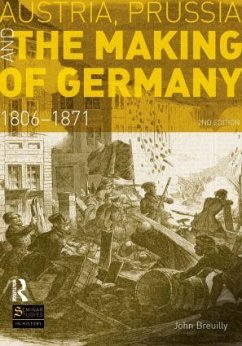- Broschiertes Buch
- Merkliste
- Auf die Merkliste
- Bewerten Bewerten
- Teilen
- Produkt teilen
- Produkterinnerung
- Produkterinnerung
Rev. ed. of: The formation of the first German nation-state, 1800-1871.
Andere Kunden interessierten sich auch für
![Frederick the Great Frederick the Great]() Tim BlanningFrederick the Great16,99 €
Tim BlanningFrederick the Great16,99 €![Fascism and the Right in Europe 1919-1945 Fascism and the Right in Europe 1919-1945]() Martin BlinkhornFascism and the Right in Europe 1919-194563,99 €
Martin BlinkhornFascism and the Right in Europe 1919-194563,99 €![The 1848 Revolutions The 1848 Revolutions]() Peter JonesThe 1848 Revolutions58,99 €
Peter JonesThe 1848 Revolutions58,99 €![Peel and the Conservative Party 1830-1850 Peel and the Conservative Party 1830-1850]() Paul AdelmanPeel and the Conservative Party 1830-185062,99 €
Paul AdelmanPeel and the Conservative Party 1830-185062,99 €![The British and French in the Atlantic 1650-1800 The British and French in the Atlantic 1650-1800]() Gwenda MorganThe British and French in the Atlantic 1650-180058,99 €
Gwenda MorganThe British and French in the Atlantic 1650-180058,99 €![The Constitutional Monarchy in France, 1814-48 The Constitutional Monarchy in France, 1814-48]() Pamela M. PilbeamThe Constitutional Monarchy in France, 1814-4858,99 €
Pamela M. PilbeamThe Constitutional Monarchy in France, 1814-4858,99 €![The Rise of Contemporary Conservatism in the United States The Rise of Contemporary Conservatism in the United States]() Kenneth J. HeinemanThe Rise of Contemporary Conservatism in the United States60,99 €
Kenneth J. HeinemanThe Rise of Contemporary Conservatism in the United States60,99 €-
-
-
Rev. ed. of: The formation of the first German nation-state, 1800-1871.
Hinweis: Dieser Artikel kann nur an eine deutsche Lieferadresse ausgeliefert werden.
Hinweis: Dieser Artikel kann nur an eine deutsche Lieferadresse ausgeliefert werden.
Produktdetails
- Produktdetails
- Seminar Studies
- Verlag: Taylor & Francis Ltd
- 2 ed
- Seitenzahl: 232
- Erscheinungstermin: 19. Mai 2011
- Englisch
- Abmessung: 239mm x 171mm x 15mm
- Gewicht: 402g
- ISBN-13: 9781408272763
- ISBN-10: 1408272768
- Artikelnr.: 33802648
- Herstellerkennzeichnung
- Libri GmbH
- Europaallee 1
- 36244 Bad Hersfeld
- gpsr@libri.de
- Seminar Studies
- Verlag: Taylor & Francis Ltd
- 2 ed
- Seitenzahl: 232
- Erscheinungstermin: 19. Mai 2011
- Englisch
- Abmessung: 239mm x 171mm x 15mm
- Gewicht: 402g
- ISBN-13: 9781408272763
- ISBN-10: 1408272768
- Artikelnr.: 33802648
- Herstellerkennzeichnung
- Libri GmbH
- Europaallee 1
- 36244 Bad Hersfeld
- gpsr@libri.de
John Breuilly is Professor of Nationalism and Ethnicity at the London School of Economics. His other publications in this field include The Formation of the First German Nation-State (1996) and, with Ronald Speirs (eds), Germany's Two Unifications: Anticipations, Experiences, Responses (2004). He is currently editing The Oxford Handbook of the History of Nationalism.
Part One: Analysis. 1 Introduction. 2 From defeat to triumph
1806-1815. 3 Cooperative Domination
1815-48. 4 Austria and Prussia lose control
1848-1849. 5 Counter-revolution
Cooperation and Conflict
1849-1858. 6 From Cooperation to War
1858-1866. 7 The Definitive Exclusion of Austria from Germany
1867-1871. 8 Comparing Austria and Prussia. 9 Conclusion. Part Two: Documents. 1 End of Empire and formation of Rheinbund. 2 Peace of Tilsit between France and Prussia
9 July 1807. 3 'A good revolution': Hardenberg's Riga Memorandum. 4 Peace of Schönbrunn between France and Austria
14 October 1809. 5 Stein to Count Münster
1 December 1812. 6 Convention of Tauroggen
30 December 1812. 7 Ernst Moritz Arndt: 'To the Prussians!'
January 1813. 8 Prussian introduction of universal conscription. 9 Frederick William III: 'An Mein Volk'
17 March 1813. 10 Kalisch Declaration of March 1813. 11 Metternich's interview with Napoleon
Dresden
16 June 1813. 12 Military forces at the Battle of Leipzig
October 1813. 13 Frederick William III promises a constitution
22 May 1815. 14 German Confederal Act
8 June 1815. 15 Vienna Final Act
15 May 1820. 16 Petition for a single customs system
April 1819. 17 Customs union agreement between Prussia and the Grand Duchy of Hesse
February 1828. 18 Memorandum of Prussian Finance Minister Friedrich von Motz
1829. 19 Metternich's reaction to Prussian customs union policy
June 1831. 20 Prussia extends its influence through customs agreements
November 1831. 21 Paul Pfizer: On the aims and tasks of German liberalism
Tübingen
1832. 22 &
1806-1815. 3 Cooperative Domination
1815-48. 4 Austria and Prussia lose control
1848-1849. 5 Counter-revolution
Cooperation and Conflict
1849-1858. 6 From Cooperation to War
1858-1866. 7 The Definitive Exclusion of Austria from Germany
1867-1871. 8 Comparing Austria and Prussia. 9 Conclusion. Part Two: Documents. 1 End of Empire and formation of Rheinbund. 2 Peace of Tilsit between France and Prussia
9 July 1807. 3 'A good revolution': Hardenberg's Riga Memorandum. 4 Peace of Schönbrunn between France and Austria
14 October 1809. 5 Stein to Count Münster
1 December 1812. 6 Convention of Tauroggen
30 December 1812. 7 Ernst Moritz Arndt: 'To the Prussians!'
January 1813. 8 Prussian introduction of universal conscription. 9 Frederick William III: 'An Mein Volk'
17 March 1813. 10 Kalisch Declaration of March 1813. 11 Metternich's interview with Napoleon
Dresden
16 June 1813. 12 Military forces at the Battle of Leipzig
October 1813. 13 Frederick William III promises a constitution
22 May 1815. 14 German Confederal Act
8 June 1815. 15 Vienna Final Act
15 May 1820. 16 Petition for a single customs system
April 1819. 17 Customs union agreement between Prussia and the Grand Duchy of Hesse
February 1828. 18 Memorandum of Prussian Finance Minister Friedrich von Motz
1829. 19 Metternich's reaction to Prussian customs union policy
June 1831. 20 Prussia extends its influence through customs agreements
November 1831. 21 Paul Pfizer: On the aims and tasks of German liberalism
Tübingen
1832. 22 &
Part One: Analysis. 1 Introduction. 2 From defeat to triumph
1806-1815. 3 Cooperative Domination
1815-48. 4 Austria and Prussia lose control
1848-1849. 5 Counter-revolution
Cooperation and Conflict
1849-1858. 6 From Cooperation to War
1858-1866. 7 The Definitive Exclusion of Austria from Germany
1867-1871. 8 Comparing Austria and Prussia. 9 Conclusion. Part Two: Documents. 1 End of Empire and formation of Rheinbund. 2 Peace of Tilsit between France and Prussia
9 July 1807. 3 'A good revolution': Hardenberg's Riga Memorandum. 4 Peace of Schönbrunn between France and Austria
14 October 1809. 5 Stein to Count Münster
1 December 1812. 6 Convention of Tauroggen
30 December 1812. 7 Ernst Moritz Arndt: 'To the Prussians!'
January 1813. 8 Prussian introduction of universal conscription. 9 Frederick William III: 'An Mein Volk'
17 March 1813. 10 Kalisch Declaration of March 1813. 11 Metternich's interview with Napoleon
Dresden
16 June 1813. 12 Military forces at the Battle of Leipzig
October 1813. 13 Frederick William III promises a constitution
22 May 1815. 14 German Confederal Act
8 June 1815. 15 Vienna Final Act
15 May 1820. 16 Petition for a single customs system
April 1819. 17 Customs union agreement between Prussia and the Grand Duchy of Hesse
February 1828. 18 Memorandum of Prussian Finance Minister Friedrich von Motz
1829. 19 Metternich's reaction to Prussian customs union policy
June 1831. 20 Prussia extends its influence through customs agreements
November 1831. 21 Paul Pfizer: On the aims and tasks of German liberalism
Tübingen
1832. 22 &
1806-1815. 3 Cooperative Domination
1815-48. 4 Austria and Prussia lose control
1848-1849. 5 Counter-revolution
Cooperation and Conflict
1849-1858. 6 From Cooperation to War
1858-1866. 7 The Definitive Exclusion of Austria from Germany
1867-1871. 8 Comparing Austria and Prussia. 9 Conclusion. Part Two: Documents. 1 End of Empire and formation of Rheinbund. 2 Peace of Tilsit between France and Prussia
9 July 1807. 3 'A good revolution': Hardenberg's Riga Memorandum. 4 Peace of Schönbrunn between France and Austria
14 October 1809. 5 Stein to Count Münster
1 December 1812. 6 Convention of Tauroggen
30 December 1812. 7 Ernst Moritz Arndt: 'To the Prussians!'
January 1813. 8 Prussian introduction of universal conscription. 9 Frederick William III: 'An Mein Volk'
17 March 1813. 10 Kalisch Declaration of March 1813. 11 Metternich's interview with Napoleon
Dresden
16 June 1813. 12 Military forces at the Battle of Leipzig
October 1813. 13 Frederick William III promises a constitution
22 May 1815. 14 German Confederal Act
8 June 1815. 15 Vienna Final Act
15 May 1820. 16 Petition for a single customs system
April 1819. 17 Customs union agreement between Prussia and the Grand Duchy of Hesse
February 1828. 18 Memorandum of Prussian Finance Minister Friedrich von Motz
1829. 19 Metternich's reaction to Prussian customs union policy
June 1831. 20 Prussia extends its influence through customs agreements
November 1831. 21 Paul Pfizer: On the aims and tasks of German liberalism
Tübingen
1832. 22 &








